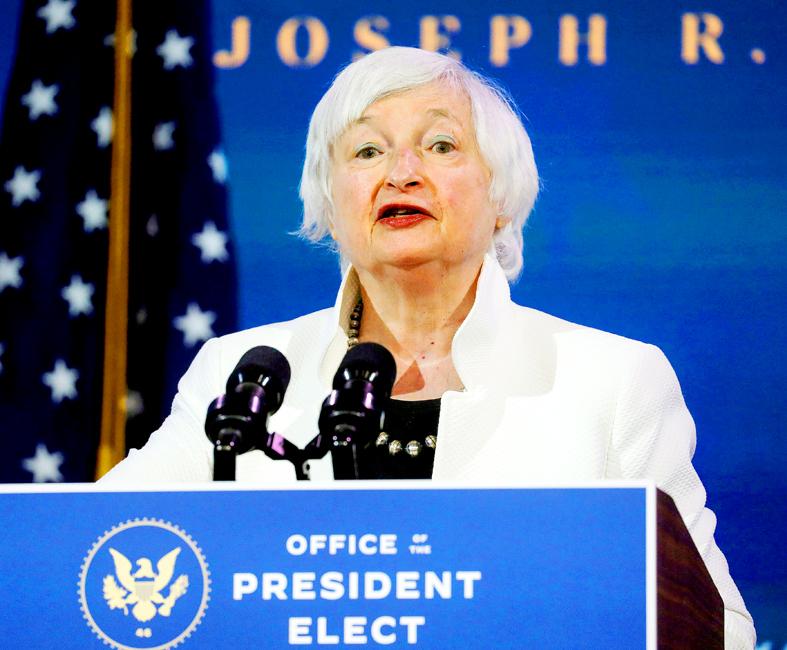The US is pushing in the G20 to adopt a global minimum corporate tax to stem the erosion of government revenue, US Secretary of the Treasury Janet Yellen said on Monday.
Just days after US President Joe Biden announced plans to raise corporate taxes in the US to finance a US$2 trillion infrastructure and jobs program, Yellen said that a collective international effort would end the “race to the bottom” on taxation.
Biden expressed outrage at multinationals such as Amazon.com Inc that have moved to tax havens or used tax loopholes, and said he would put a stop to the practice.

Photo: Reuters
His plan would raise the US corporate tax rate to 28 percent and the minimum for multinationals to 21 percent.
He dismissed concerns that the higher rate would drive companies overseas, telling reporters that “there’s no evidence of that.”
“We’re talking about a 28 percent tax that everybody thought was fair enough for everybody,” he said. “I’m going to push as hard as I can [to] change the circumstances so we can compete with the rest of the world.”
Yellen said the practice of seeking tax havens erodes government revenue and undermines an economy’s competitiveness.
“Together we can use a global minimum tax to make sure the global economy thrives based on a more level playing field in the taxation of multinational corporations,” she said in a speech to The Chicago Council on Global Affairs.
The interconnected global economy has led to “a 30-year race to the bottom on corporate tax rates.”
However, for companies and economies to remain competitive, governments must make sure they “have stable tax systems that raise sufficient revenue to invest in essential public goods and respond to crises, and that all citizens fairly share the burden of financing government.”
Biden’s proposal recognizes “it is important to work with other countries to end the pressures of tax competition and corporate tax base erosion,” Yellen said.
A Treasury official told reporters that the G20 goal is to have a proposal on the global minimum tax by July, and the Biden administration could, if needed, change its legislation to bring the US minimum tax into line with the international plan.
A G20 agreement would give a push to ongoing negotiations in the broader Organisation for Economic Co-operation and Development on a global minimum tax to protect all members from erosion of tax revenue.
“Taxes matter to development and it’s important that the world get it right,” World Bank president David Malpass said on CNBC.
He declined to comment on the US proposal.
Yellen’s speech, ahead of the spring meetings of the IMF and World Bank, as well as the G20 meeting, all virtual, also outlined the Biden administration’s push for multilateral cooperation.
The Biden administration already announced that it is rejoining the Paris climate accords and removed obstacles in the WTO that allowed the global body to name a new leader.
In the trade arena, she said that Washington would work with partners to “enforce a rules-based order.”
With China, the relationship “will be competitive where it should be, collaborative where it can be and adversarial where it must be,” she said.

Stephen Garrett, a 27-year-old graduate student, always thought he would study in China, but first the country’s restrictive COVID-19 policies made it nearly impossible and now he has other concerns. The cost is one deterrent, but Garrett is more worried about restrictions on academic freedom and the personal risk of being stranded in China. He is not alone. Only about 700 American students are studying at Chinese universities, down from a peak of nearly 25,000 a decade ago, while there are nearly 300,000 Chinese students at US schools. Some young Americans are discouraged from investing their time in China by what they see

Taiwan Transport and Storage Corp (TTS, 台灣通運倉儲) yesterday unveiled its first electric tractor unit — manufactured by Volvo Trucks — in a ceremony in Taipei, and said the unit would soon be used to transport cement produced by Taiwan Cement Corp (TCC, 台灣水泥). Both TTS and TCC belong to TCC International Holdings Ltd (台泥國際集團). With the electric tractor unit, the Taipei-based cement firm would become the first in Taiwan to use electric vehicles to transport construction materials. TTS chairman Koo Kung-yi (辜公怡), Volvo Trucks vice president of sales and marketing Johan Selven, TCC president Roman Cheng (程耀輝) and Taikoo Motors Group

MAJOR DROP: CEO Tim Cook, who is visiting Hanoi, pledged the firm was committed to Vietnam after its smartphone shipments declined 9.6% annually in the first quarter Apple Inc yesterday said it would increase spending on suppliers in Vietnam, a key production hub, as CEO Tim Cook arrived in the country for a two-day visit. The iPhone maker announced the news in a statement on its Web site, but gave no details of how much it would spend or where the money would go. Cook is expected to meet programmers, content creators and students during his visit, online newspaper VnExpress reported. The visit comes as US President Joe Biden’s administration seeks to ramp up Vietnam’s role in the global tech supply chain to reduce the US’ dependence on China. Images on

New apartments in Taiwan’s major cities are getting smaller, while old apartments are increasingly occupied by older people, many of whom live alone, government data showed. The phenomenon has to do with sharpening unaffordable property prices and an aging population, property brokers said. Apartments with one bedroom that are two years old or older have gained a noticeable presence in the nation’s six special municipalities as well as Hsinchu county and city in the past five years, Evertrust Rehouse Co (永慶房產集團) found, citing data from the government’s real-price transaction platform. In Taipei, apartments with one bedroom accounted for 19 percent of deals last